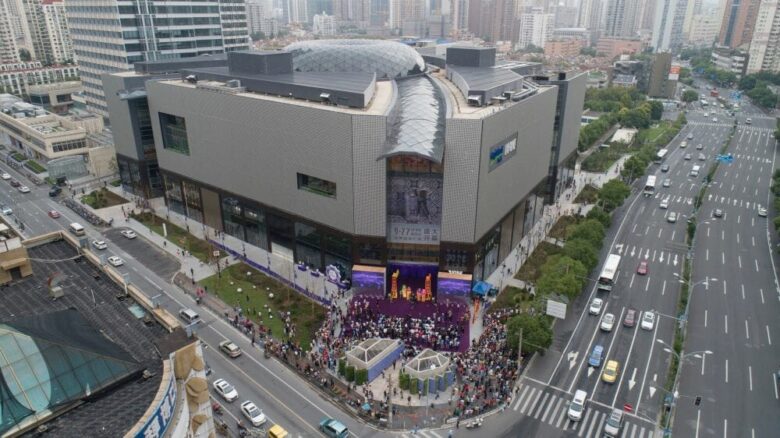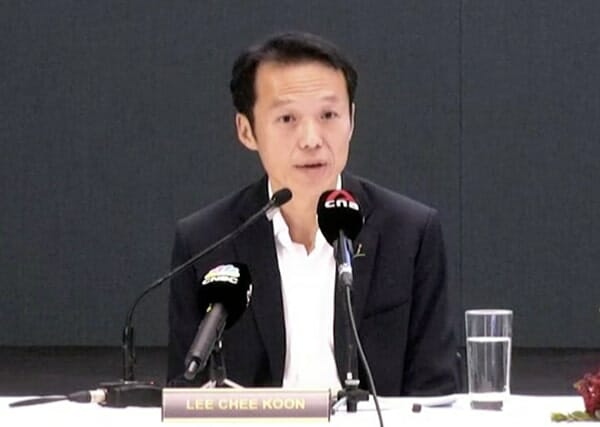
CLI bought a nearly one-third stake in Shanghai’s CapitaMall LuOne this year (Source: CapitaLand)
CapitaLand Investment Ltd saw its profit drop by 38.3 percent to S$433 million ($316 million) in the first half of this year as the listed fund manager took a hit from China’s stringent lockdowns while divesting assets at a slower pace than had previously been anticipated.
The SGX-listed fund management arm of property giant CapitaLand Group saw its profit attributable to owners plunge from the S$702 million it posted in the first half of 2021 even as it reported increases of nearly a third in fee income and lodging management revenue, according to a bourse filing Thursday.
In a briefing that same day, CLI group chief executive officer Lee Chee Koon linked the firm’s loss to slow sales of assets, especially in China, one of CLI’s two core markets alongside Singapore, as well as to rental rebates extended to retail tenants on the mainland as the Asian powerhouse continues its battle to stamp out COVID.
“Our numbers could have done better if not for two reasons, one is really the COVID zero policy in China, especially in Shanghai where we have the biggest exposure,” Lee told the briefing. “The other reason is largely around capital recycling… there’s quite a lot of work to do to catch up in the second half.”
Asset Sales Stumble
CLI’s earnings before interest, taxes, depreciation and amortisation (EBITDA) – a proxy for cash flow – fell to S$873 million in the six months ending June, which was down 32 percent from S$1.28 billion a year ago.

CapitaLand Investment group CEO Lee Chee Koon
Excluding gains from divestments, the company’s boosted its operating profit after taxation and minority interests, or PATMI, by 31 percent to S$346 million in the first half of this year, due to strong fee income, a rebound in its lodging management business and improving performance from retail assets in Singapore and Malaysia.
A dearth of asset recycling opportunities resulted in portfolio gains of just S$133 million, versus the S$532 million it booked a year ago. Despite this, Lee assured that the firm is still on track to reach its S$3 billion annual target for capital recycling after divesting S$1.6 billion worth of assets in the first half.
Those divestments were dominated by two sales involving CapitaLand Integrated Commercial Trust (CICT), a REIT managed by CLI, including the fund manager’s S$1.26 billion sale of 79 Robinson Road Singapore to CICT and a CapitaLand Group-managed private fund. CICT also agreed to sell the JCube mall in the Little Red Dot’s Jurong Lake District to CapitaLand for S$340 million in January of this year.
In the first half of 2021 the firm’s S$13 billion in asset sales had been led by the $7 billion divestment of the China Raffles City portfolio to mainland insurer Ping An.
Suffering with the Mainland
With 37 percent of its S$46 billion in assets under management located in China, CLI took a hit from the mainland’s stringent pandemic control measures this year.
Despite China’s spasmodic lockdowns, the firm made three investments in the country so far this year without making any divestments, including acquiring a 31 percent interest in CapitaMall LuOne in Shanghai for S$169 million. Also during 2022, CLI established a RMB 700 million ($104 million) fund as its first onshore investment vehicle in China, and deployed that equity to acquire an office building in Shanghai. In March, its lodging business unit, The Ascott, bought a pair of serviced apartment blocks in Ningbo.
This year’s profit slump was mitigated by improving earnings from CLI’s shopping malls and accommodation assets across markets, where revenues from its lodging business surged by 37 percent to reach S$118 million as travel resumed in many parts of the world. Fund management fees also inched up by 5 percent to S$207 million.
Ample Dry Powder
Despite the profit slide, Lee vowed that the fund manager will continue to seek opportunities to expand and diversify its portfolio, while exercising “patience and prudence” in making investment decisions amid the heightened market uncertainty.
“CLI is in a strong financial position, and we have ample dry powder ready to deploy on the right opportunities to propel our long-term sustainable growth as a global real estate investment manager,” the 47-year-old executive said.
CLI, which launched on the SGX last September as a spin-off of Temasek-backed CapitaLand Group, said it remains on track to hit S$100 billion in funds under management by 2024 after having reached FUM of S$86 billion at the end of June.
Considering Ascott’s July agreement to acquire serviced residence provider Oakwood Worldwide from Mapletree Investments, CLI also emphasised that it remains on target to reach its goal of having 160,000 lodging units under management by next year.
“The post-pandemic reopening of most economies around the world has boosted retail and workspace recovery and provided strong support for our lodging business as demand for global travel resumes,” CLI chairman Miguel Ko said in a statement.
Rival CDL Bounces Back
While CLI suffers, its local rival City Developments Ltd reported a record S$1.1 billion profit for the first half after getting hit with a S$32 million net loss a year ago.
The city-state’s largest non-government-backed developer owes much of its rebound to a one-time gain from its divestment of Millenium Hilton Seoul hotel to Korean fund manager IGIS Asset Management last December, according to CDL’s interim statement.
The developer controlled by Kwek Leng Beng is recovering from the nearly S$2 billion loss it reported in 2020 when it had to write off its joint venture with bankrupt mainland builder Sincere Property Group after investing a total of $1.4 billion.
Leave a Reply